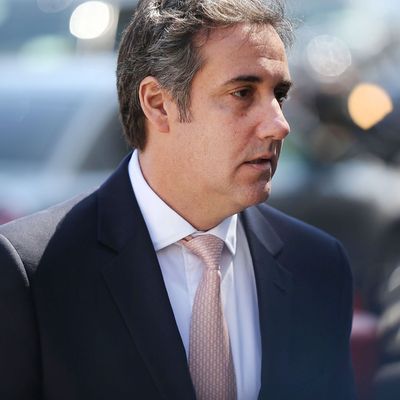
On November 7, 2016, Michael Cohen was a former personal injury lawyer turned taxi medallion speculator, nondisclosure-agreement drafter, and brand-licensing negotiator.
Three months later, he had become a policy wonk with such penetrating insight into antitrust law, the American health-care system, corporate taxation, “accounting standards on production costs,” and “legislative policy development,” multinational companies were willing to spend hundreds of thousands of dollars to lease his expertise.
On Tuesday, Michael Avenatti, attorney of Stephanie Clifford (a.k.a. Stormy Daniels), released financial information about the limited liability corporation that Michael Cohen used to distribute hush money to Donald Trump’s alleged paramours during the 2016 campaign — and then, to collect “consulting fees” from major corporations following the mogul’s inauguration.
But the exact details of Essential Consultants LLC’s business practices are only now coming into view. On Thursday night, the Washington Post revealed that AT&T’s $600,000 contract with Cohen stipulated that he would provide “advice” on the telecom company’s proposed merger with Time Warner, which was awaiting the Trump administration’s approval. Under the terms of the deal, Cohen was to divide his time between “regulatory policy development” and “legislative policy development.”
In other words: AT&T gave over half-a-million dollars to Cohen’s company — which had, on occasion, made payments to porn stars on the president’s behalf — because the telecom company believed that doing so would increase the odds of the president approving their $85 billion merger, and signing a corporate tax cut bill that was maximally deferential to its interests. On Friday, AT&T CEO Randall Stephenson called his company’s decision to hire Cohen a “big mistake” — that was, nonetheless, “done according to the law and entirely legitimate” — and then announced that one of the executives who worked on the deal with Cohen, Bob Quinn, would be retiring.
Around the same time Cohen struck a deal with the telecom, the Swiss drugmaker Novartis inked a $1.2 million contract with Cohen to advise it on American health-care policy (i.e., help ensure that the GOP’s health-care bill didn’t threaten its interests), while the aircraft manufacturer Korea Aerospace paid the president’s personal attorney $150,000 for “legal consulting concerning accounting standards on production costs” (exactly what that meant is unclear, but the company’s former chief executive was charged with account fraud last September, and amid the scandal, one of its senior officers committed suicide).
It’s possible that Essential Consultants LLC was among Michael Cohen’s most legally legitimate business ventures. Well-connected people selling access to and/or influence over the American government isn’t just legal in the U.S. — it’s one of our nation’s growth industries. Unless some of the funds paid to Essential Consultants made their way back to Trump (a not wholly implausible scenario), Cohen’s lobbying career was likely aboveboard.
But it is, of course, an ethical monstrosity. The Trump team’s handling of the AT&T-Time Warner merger looked fundamentally corrupt, even before these revelations. Last July, a senior White House official told the New York Times that administration advisers had discussed using Time Warner’s desired merger as a “point of leverage” over CNN (its subsidiary), in an attempt to coerce the news network into giving Trump more positive coverage. Before that, presidential son-in-law Jared Kushner had (reportedly) complained to Time Warner executive Gary Ginsberg about CNN’s “unfair coverage” of the president.
These actions cast a cloud of impropriety over the Justice Department’s subsequent decision to block the merger, which would have otherwise been quite defensible. Now, it appears that Trump’s inner circle not only tried to use the pending merger as a tool for extracting more favorable coverage from CNN — but also, at least in Cohen’s case, as one for extracting hundreds of thousands of dollars from AT&T. If any of that money did get back to the president —or else, to someone that Trump had an interest in shutting up — it might well represent the slimiest pay-to-play scandal in the history of the American presidency.
And yet, the president who campaigned against D.C.’s swamp of corruption — and the “politics of personal profit” — has felt no need to feign concern over the revelation that his personal lawyer was selling access to his White House (via the same LLC that made payments on the president’s behalf), or publicly address the matter in any way. More remarkably, few appear to be treating this silence as a scandal in itself.
One has to wonder: Might the news that president Hillary Clinton’s lawyer had collected nearly $3 million from multinational corporations looking to influence her White House, including one whose merger she’d threaten to veto because their subsidiary’s news coverage wasn’t liberal enough — and did so, specifically by making a “consulting firm” out of the limited liability corporation that he had used in October 2016 to buy Ron Jeremy’s silence about his history with Hillary — be covered somewhat differently?






























